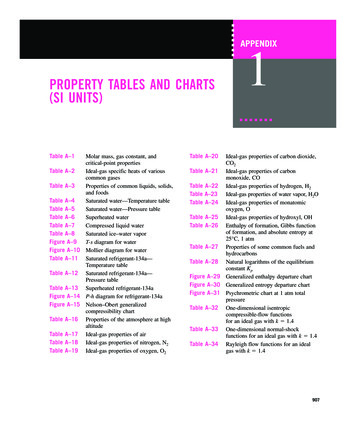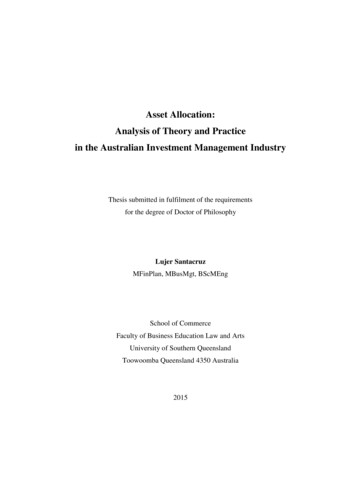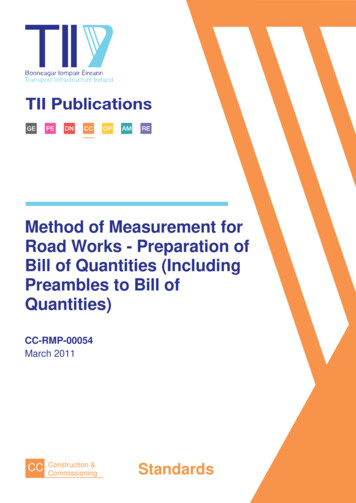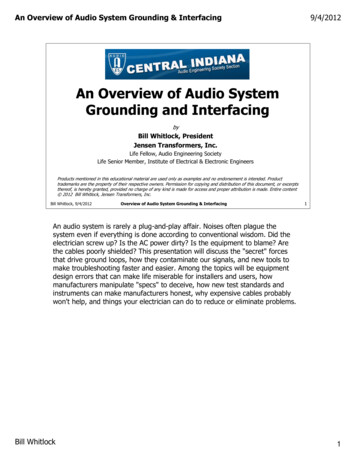
Transcription
Table of ContentsPreface . . . . . . . . . . . . . . . . . . . . . . . . . . . . . viiiAbbreviations . . . . . . . . . . . . . . . . . . . . . . . . . . . xWhat Would It Look Like If You Knew a Little Greek? . . . . . . . . . . . . . xiPart I: Foundational Greek1. The Greek Language . . . . . . . . . . . . . . . . . . . . . . . 22. The Greek Alphabet . . . . . . . . . . . . . . . . . . . . . . . 43. Pronunciation . . . . . . . . . . . . . . . . . . . . . . . . . . 84. English Grammar: Noun Inflection . . . . . . . . . . . . . . . . . . 135. Greek Grammar: Nouns . . . . . . . . . . . . . . . . . . . . . . 176. Prepositions . . . . . . . . . . . . . . . . . . . . . . . . . . 227. English Grammar: Verb Inflection . . . . . . . . . . . . . . . . . . 248. Greek Grammar: Verbs (Indicative) . . . . . . . . . . . . . . . . . . 309. Greek Grammar: Verbs (Nonindicative) . . . . . . . . . . . . . . . . 3710. Word Studies . . . . . . . . . . . . . . . . . . . . . . . . . . 41Part II: Church Greek11. Cases . . . . . . . . . . . . . . . . . . . . . . . . . . . . 7012. Pronouns . . . . . . . . . . . . . . . . . . . . . . . . . . . 8013. Modifiers . . . . . . . . . . . . . . . . . . . . . . . . . .8414. Phrasing 101 . . . . . . . . . . . . . . . . . . . . . . . . .9315. Verbal Aspect . . . . . . . . . . . . . . . . . . . . . . . . . 11616. Verbs (Voice) . . . . . . . . . . . . . . . . . . . . . . . . . 12117. Verbs (Tense) . . . . . . . . . . . . . . . . . . . . . . . . . 12618. Verbs (Nonindicative) . . . . . . . . . . . . . . . . . . . . . . 13319. Participles . . . . . . . . . . . . . . . . . . . . . . . . . . 13920. Conjunctions . . . . . . . . . . . . . . . . . . . . . . . . . 14621. Phrasing 102 . . . . . . . . . . . . . . . . . . . . . . . . . 157Part III: Functional Greek22. Pronouns . . . . . . . . . . . . . . . . . . . . . . . . . . . 17623. Definite Article, and Odds ‘n Ends . . . . . . . . . . . . . . . . . . 18224. Adjectives . . . . . . . . . . . . . . . . . . . . . . . . . . 18825. Phrases and Clauses . . . . . . . . . . . . . . . . . . . . . . . 19226. Phrasing 103 . . . . . . . . . . . . . . . . . . . . . . . . . 19927. Nouns . . . . . . . . . . . . . . . . . . . . . . . . . . . 21428. Verbs (Indicative) . . . . . . . . . . . . . . . . . . . . . . . . 22229. Verbs (Nonindicative) . . . . . . . . . . . . . . . . . . . . . . 22630. Phrasing 104 . . . . . . . . . . . . . . . . . . . . . . . . . . 23731. The History of the Bible and Textual Criticism . . . . . . . . . . . . . . 25032. Translations . . . . . . . . . . . . . . . . . . . . . . . . .26433. How to Read a Commentary . . . . . . . . . . . . . . . . . . .279Vocabulary . . . . . . . . . . . . . . . . . . . . . . . . . . . 287Index . . . . . . . . . . . . . . . . . . . . . . . . . . . . . 289
PrefaceWhen people learn that I am a Greek teacher, one of the more common responses is, “Ihave always wanted to learn Greek.” (It may not be the most common, but it has happenedrepeatedly.) I always ask them why they want to learn Greek. To date, only one person hassaid he really wants to learn the language. What they want is to understand the Bible better,and especially to know what the Greek words behind the English translation mean.In a perfect world, we would all know Greek and be able to understand the Bible betterbecause we would not rely on translations. But the world is not perfect, and many people arenot able to spend the years required to learn Greek properly, even those who have a seminary education.As I thought about how I might help the situation, I came to the conclusion that if peopleknew a little about Greek and a lot about how to use the good biblical study tools, they couldin fact glean much from the Bible and from other resources that are otherwise beyond theirgrasp. This includes: making sense of the information that Bible software showsfinding what the Greek words meanseeing the author’s flow of thought and his central messageunderstanding why translations are differentreading good commentaries and using other biblical tools that make use of GreekSeveral years ago I wrote The Interlinear for the Rest of Us: The Reverse Interlinear, whichhelps people get to the Greek behind the English (and this data is used by some of the Biblesoftware programs), and now I am writing this text to help you learn how to use IRU andother such tools.There are, of course, many dangers in relying on tools rather than fully learning Greek,and I expressed those concerns in the preface to IRU. My fear is that people will think theyknow Greek well enough to come up with their own interpretations without commentarysupport. However, this is the same concern I have for all my first-year Greek students learning Greek in a traditional manner. Alexander Pope once said, “A little knowledge is a dangerous thing.” But as I indicated in IRU, I saw that it is a little bit of arrogance that is dangerous. So I offer this text, trusting that you will recognize the limits of the approach.GRU is divided into three sections. viiiFoundational Greek teaches you enough Greek so you can use the Bible studysoftware, understand a Strong’s Bible, and do Greek word studies.Church Greek teaches you more Greek so you can understand a reverse interlinearand use better reference works, especially commentaries.Functional Greek teaches you even more Greek so you can be comfortable working with a traditional interlinear and go even deeper into the best commentaries.Greek for the Rest of Us
The greatest challenge of the book was to find good examples of what I amteaching, especially for the homework assignments. All homework assignmentsare posted on the online class, www.teknia.com/greekfortherestofus. This allows meto continually update my work. Please keep an eye on the website as I am continually tweaking and upgrading it.The online course is comprised of three smaller courses that correspond to these three sections of this text. These will help you walk through this textbook. I also am doing a threepart video series that works its way through the textbook. They can be purchased at theonline class.There are, in fact, many helps on the website. Go to the chapter you are currently studyingand see what is there. You will find resources such as study notes, summaries, all the vocabulary words (and you can hear me say the words), all the homework exercises, fun things todo, and perhaps most important, a summary of all the grammar (available at the last lectureof Functional Greek).Of the many people I would like to thank, most goes to my Greek assistant Matt Smith forhis many hours of help, to my colleagues Lynn Losie, Doug Stuart, and Daniel Wallace fortheir help, to my editor Verlyn Verbrugge, and to many students who patiently enduredwhile I changed my mind on how to teach this material. The two Western Seminary classesthat helped the most were the D.Min class with Lew Dawson, and the M.Div class of 2012–13with Paul Alexander, Steve Davis, Mike Dedera, Lucas Howard, Aaron Larson, Nick Marks,Phil Rankin, Joshua Smith, and Katy Shaw. Thanks also to the many laypeople who read thetext, and to Robin, my wife, who patiently encouraged me to finish the task well.I have relied quite heavily on the work of my friend Daniel Wallace and his grammar, TheBasics of New Testament Syntax. Many of the grammatical categories and examples I use arefrom his work, and this should prove an easy transition for you to move from Greek for theRest of Us to his work. I would encourage you to do so. If you are especially adventureous,you should use his full grammar, Greek Grammar Beyond the Basics.I will primarily be using Accordance to illustrate Bible software, but you can also useLogos, The Bible Study App (from OliveTree), WORDsearch, BibleGateway.com, and possibly others.It has been rewarding to teach this book many times in many venues (churches, weekendretreats, seminaries, etc.). As a result, I radically altered the order of the material in the second edition. This allows you to set three different goals; and no matter how far you workinto the book, what you learn will help you go deeper in your Bible study.I am also thankful that Lee Fields has written the Hebrew counterpart, Hebrew for the Restof Us. My old Appendix on Hebrew can still be downloaded from the online class, but Iencourage you to study his book.I trust that you will find this a valuable resource as you work to understand the Word ofGod better.Bill MounceWashougal, WAPreface ix
AbbreviationsBible VersionsESVKJVNASBNEBNETNIVNIV (1984)NIrVNKJVNLTNRSVRSVTEVTNIVEnglish Standard VersionKing James VersionNew American Standard Bible (1995)New English BibleNew English TranslationNew International Version (2011 edition)New International Version (1984 edition)New International Reader’s VersionNew King James VersionNew Living TranslationNew Revised Standard VersionRevised Standard VersionToday’s English VersionToday’s New International VersionBook AbbreviationsBBGBNTSBDAGGGBBIRUMRINTThe Basics of Biblical Greek (William Mounce, Zondervan)The Basics of New Testament Syntax (Daniel Wallace, Zondervan)A Greek-English Lexicon of the New Testament and Other Early Christian Literature(3rd ed.; revised and edited by Frederick Danker, University of Chicago)Greek Grammar Beyond the Basics (Daniel Wallace, Zondervan)Interlinear for the Rest of Us: A Reverse Interlinear for New Testament Word Studies(William Mounce, Zondervan)Mounce Reverse-Interlinear New Testament (a module for Accordance)Other Abbreviationse.g.for examplei.e.that is (used for a restatement)ffmore than one following pagevvversesfxone following pageGreek for the Rest of Usvverse
What Would It Look LikeIf You Knew a Little Greek?What will you be able to do when you aredone working through this text that, perhaps, you cannot do now?1. How do I use my software? Software hasprogressed so far that now it can be a significant tool in your Bible study. This is apleasant improvement since I wrote the firstedition of GRU. You can call up a verse andmouse-over an English word, and the software will show you all sorts of dazzlinginformation. But what does it all mean?If you check out John 3:16 in theMOUNCE-NTtranslation,you might seesomethingunusual, not“For God soloved theworld” but“For this is how God loved the world” followed with a colon.You can look over at your Greek text andsee what Greekword is beingtranslated, butif you don’tknow theGreek alphabetthat doesn’thelp.If you lookin the Instant Details window (I am usingAccordance software), it gives you somemore information about this Greek word.But what does “Adverb (intensity)” mean,and why can the MOUNCE-NT translationtreat it so differently than other translations(except the NET)?If you have a real Greek dictionary, youcould double click οὕτως and see a fullerdefinition of the word, but can you understand it?By the time you are done with GRU, allthese mysteries and many more will bemade clear!2. You will discover the meaning of the Greekwords that lie behind the English. This is calleddoing “word studies.” Without knowingGreek or without learning how to use thestudy tools, the best you can do is learnwhat the English word means. But as youwill see, words have a range of meanings.Think through all theways we use the word“can” and “run.” WordsWhat Would It Look Like If You Knew a Little Greek? xi
don’t have exact counterparts in differentlanguages. The range of meaning of anEnglish word will almost never be the sameas the range of meaning for the Greek wordbehind the English. We call this the word’s“semantic range.” So just because an Englishword can have a certain meaning, it is by nomeans certain that the Greek behind it hasthat specific meaning.A good example of this is the Greek wordσάρξ, sarx. This word can be translated manydifferent ways because English has no exactcounterpart to it. In as short a book asGalatians we find sarx translated by the NIV(1984, changed in the 2011 edition) as“flesh,” “human effort,” “illness,” “man,”“no one,” “ordinary way,” “outwardly,”“sinful nature,” and “that nature.” All theseEnglish words partially overlap in meaningwith sarx, but none is an exact equivalent.Another example is in 1 Corinthians 7:1.illnessfleshhumaneffortordinary waysa vrxsinfulnaturethat naturemanoutwardlyno oneThe RSV translates, “It is well for a man notto touch a woman.” Lots of good youthgroup talks on dating come out of the word“touch.” But guess what? The NIV (1984)translates 1 Corinthians 7:1 as, “It is good forxiiGreek for the Rest of Usa man not to marry.” Wait a minute! Are wetalking about dating or are we talking aboutmarriage? The fact of the matter is that haptesthai can mean “to touch,” or it can bespeaking of marriage or even sexual relations (see the NIV 2011). Translators have topick one meaning or the other.There is another example later on in thesame chapter. The RSV translates 1 Corin–thians 7:36 as,If any one thinks that he is not behavingproperly toward his betrothed, if his passionsare strong, and it has to be, let him do as hewishes: let them marry—it is no sin.Paul has been encouraging people not tomarry in order to be more involved in thegospel ministry, but then he says that ifthat’s not your gift, if your passions arestrong, then there is nothing wrong with getting married. Go ahead and marry your“betrothed.” “Any one” refers to the fiancé.However, when you read the same verse inthe NASB it reads,But if any man thinks that he is acting unbecomingly toward his virgindaughter, if she is past her youth, andif it must be so, let him do what hewishes, he does not sin; let hermarry.The italics in the NASB’s translation indicate that it has added a word, but the difference is more than that. The question is, whois the “man”? In the NASB, Paul is thinkingof a father/guardian who believes hisdaughter’s fiancé is acting improperly. Eitherway you look at this verse, it can be confusing.
Another example is John 3:16.For God so loved the world that he gave hisone and only Son, that whoever believes inhim shall not perish but have eternal life(NIV).smaller, more manageable, units, locate themain thought, and see how the other statements in the passage relate to the mainpoint. You will then lay the passage out visually in a way that helps you see the author’sflow of thought. This is the best way to helpyou learn what good commentary writersare trying to do.For example, below is the salutation fromJude. How many main thoughts are there,and how many descriptions of the recipientsdoes the author include?The salutation breaks down into three sec-What does “so” mean? Most readers think itmeans “a lot.” That’s about the only waysomeone would read the English. But didyou know that the Greek word behind “so”most likely means, “in this way”? “For Godloved the world in this way: he gave.” Thegiving of his Son shows how God loved theworld, not how much. (Thisis why the footnote in the1:1Jude,ESV reads, “Or For this isa servant of Jesus Christ andhow God loved the world.”)a brother of James,My favorite exampleTo thosewhen it comes to translatingwho have been called,who areloved by God the Father andwords is Matthew 26:27,kept by Jesus Christ:which talks about theLord’s Supper. The KJV1:2Mercy, peace and love be yours in abundance.says,Drink ye all of it.My dad tells the story of how, when he wasyounger, he made sure he drank every lastlittle bit of grape juice in the communioncup. He would shake it until every drop wasgone; he was going to obey Scripture anddrink “all of it.” Only one problem: that’s notwhat the verse means. The “all” means “allof you,” not “all the liquid.” The RSV translates, “Drink of it, all of you.”So as we learn about Greek and translations, we’ll see why these types of differences occur, and give you the tools to helpyou determine what the Greek really means.3. You will also learn the basics of exegesis.“Exegesis” is a fancy word for Bible study.Using a methodology I call “phrasing,” youwill learn to divide a biblical story intotions: author; recipients; greeting. Jude tellsus three things about the recipients: theyhave been called; they are loved by God;they are kept by Jesus.4. You will often be able to understand whytranslations are different. How many timeshave you been in a Bible study where theleader is discussing a verse, but your Bibleappears to say something considerably different? How can the translations be so different? What does the verse really say? Let megive you a few examples.Luke 2:14 is one of the better-knownverses in the Bible. In the KJV it reads,Glory to God in the highest, and on earthpeace, good will toward men.What Would It Look LikeIf You Knew a Little Greek? xiii
Is there anything in this verse that bothersyou? It is a statement of blessing, and God’sangels say, “peace, good will toward men.”Does God’s peace extend to all people?“Peace” is a marvelous biblical concept thatdesignates a cessation of hostility betweenGod and us; it’s the result of justification(Rom 5:1).The RSV says,Glory to God in the highest, and on earthpeace among men with whom he is pleased!Here, peace isn’t extended to all people, butonly to those who are the recipients of God’spleasure. Why are the KJV and the RSV different? The answer is that the Greek manuscripts are different at this verse. Some haveeudokias with the “s” (the Greek sigma),which is followed by the RSV; others haveeudokia, which is followed by the KJV. The“s” completely changes the meaning. (I willdiscuss the issue of different Greek manuscripts in chapter 31.)Another example is Mark 16. If you arereading Mark 16 in the RSV, after the womensee that the tomb is empty, the Bible says,And they went out and fled from the tomb;for trembling and astonishment had comeupon them; and they said nothing to any one,for they were afraid.The gospel ends at verse 8 on a note of fear.But let me tell you a story that is related,although it won’t sound like it at first. Haveyou ever seen those movies they often showin high school sociology class about thesnake people of the Appalachians? Theyhandle rattlesnakes as part of their churchworship, and they don’t die. They also drinkpoison, and they don’t die. Why are thesepeople doing this? Why are my cousinsdoing this? (They actually are my cousins, byxivGreek for the Rest of Usthe way. My family is from Gravelswitch,Kentucky.) “Because the Bible says so,” theywould respond. If you are reading the KJV, itdoesn’t stop at verse 8 but goes on to verse20. Verses 17–18 say,And these signs shall follow them thatbelieve; In my name shall they cast out devils; they shall speak with new tongues; Theyshall take up serpents; and if they drink anydeadly thing, it shall not hurt them; theyshall lay hands on the sick, and they shallrecover.Wouldn’t you like to know whether theseverses truly belong in the Bible or not?Here is a more subtle example. In 2 Corinthians 1:15 the ESV reads,Because I was sure of this, I wanted to cometo you first, so that you may have a secondexperience of grace.Sounds as if Paul is talking about a secondwork of grace subsequent to conversion. Butsee how other translations handle the passage.In this confidence I intended at firstto come to you, so that you mighttwice receive a blessing (NASB).Because I was sure of this, I wantedto come to you first, so that youmight have a double pleasure (RSV).Because I was confident of this, Iwanted to visit you first so that youmight benefit twice (NIV).Since none of the other translations give anysuggestion of a second work of grace, it isdoubtful that the ESV means to suggest this.(I can say this with full certainty, since I wasone of the twelve translators of the ESV.)
So what are we going to do with these differences? First of all, we will work to understand why they are different. Second, we willlearn to pull the translations together. Sooften in Bible study when the translationsare different, we seem content to let themsay different things. Rather, what we need todo is use the different translations to cometogether and arrive at a common meaning, ameaning that perhaps has several nuancesthat the different translations are trying toconvey.5. The final thing that I am going to help youlearn is how to read good commentaries. Let’ssay you’re going to have a Sunday Schoollesson on Romans 1:17 and you need thehelp of a commentary. (A commentary is abook that explains what each verse means.)One of the best commentaries on Romans isby C. E. B. Cranfield, so let’s say you pick itup and try to read his discussion of theverse. Here is a small part of his discussion(pp. 95-96).The other main disagreement concerns thequestion whether in the phrase δικαιοσύνηθεοῦ in 1.17; 3.21, 22 (cf. 10.3) θεοῦ is to beunderstood as a subjective genitive or as agenitive of origin, or—to put it differently—whether δικαιοσύνη refers to an activity ofGod or to a status of man resulting fromGod’s action, righteousness as a gift fromGod. In support of the view that θεοῦ is asubjective genitive and δικαιοσύνη refers toGod’s activity, a number of arguments havebeen advanced: (i) That in 3.5 (θεοῦ δικαιοσύνη) θεοῦ must be a subjective genitive (cf.also 3.25, 26) . Does this make sense? Probably not rightnow. But by the end of this text you willknow what a subjective genitive and a genitive of origin are. You’ll know what a genitive is. I want you to know enough aboutEnglish and Greek grammar so that you canpick up an excellent commentary and be ableto follow the discussion.Stated in reverse, I don’t want you tomake silly mistakes that come from misreading commentaries or misapplying Greekgrammar. For example, you probably knowthe passage, “Are all apostles? Are all prophets? Are all teachers? Do all work miracles?Do all speak in tongues?” (1 Cor 12:29).Have you ever heard anyone claim theanswer is “Yes,” and insist that a “real”Christian must have spoken in tonguesonce? I have. But when you get your commentary on 1 Corinthians out, you will readsomething like this: “Questions preceded byμή expect a negative answer.” What doesthat mean? It means that Greek can indicatewhether the person asking the questionexpects the answer “Yes” or “No.” (We dothis in English by adding a phrase, like: “Alldon’t speak in tongues, do they?”) In 1Corinthians 12:29, the Greek indicates thatPaul’s expected answer is, “No.”LimitationsThere are limitations to our approach, butthey are the same limitations placed on anyfirst-year Greek student. You are at thebeginning stages of learning Greek, and myconcern is that you will forget that you knowonly a little. I’m going to give you the abilityto sound authoritative by citing Greek wordsand grammar, and perhaps be completelywrong. I actually put off writing this bookfor several years because of this concern, butI finally came to the conclusion, as I’ve said,that it’s not a little Greek that proves dangerous. It’s a little bit of pride that proves dangerous.What Would It Look LikeIf You Knew a Little Greek? xv
If you don’t respect the fact that you areonly starting to learn Greek, then these toolscan become just another way in which youcan be wrong. I know a well-known speakerwho was talking about how a Christianshould not incur debt. I believe in debt-freeliving, so don’t misunderstand me at thispoint, but the problem was in how he usedRomans 13:8: “Owe no one anything, exceptto love each other, for the one who lovesanother has fulfilled the law” (ESV). Heclaimed something like the following.Now what’s really important in Romans 13:8is that there are three negations. Unlike inEnglish, where if you have two negationsthey cancel each other out, in Greek whenyou have double negations they pile up oneach other making the statement stronger.Paul has three negations in Romans 13:8 andhe’s making the point that it’s really a sinever to go into debt.But the fact of the matter is that there areno negatives in this verse in the sense thisauthor speaks of negatives. (You will find μήused once in the idiom εἰ μή, except, andtwice as parts of words meaning to no oneand nothing). In none of these situations dothe rules the speaker was citing apply. He isteaching thousands of people, and he’swrong. So I say as a gentle warning: pleaseremember what we’re doing and what we’renot doing. We’re learning to use the tools;we’re trying to follow good commentaries;we’re trying to understand what wordsmean. We’re not learning enough Greek tomake complicated grammatical pronouncements that aren’t supported by the commentaries.I remember when I was in seminary sitting in the balcony of a large and wellknown church listening to the preacher say,xviGreek for the Rest of Us“Well, the Greek says this and the Greek saysthis.” And I’m looking at the Greek and I say(I hope to myself), “You’re wrong, you’rewrong, you’re wrong.” He didn’t reallyknow Greek, but he was using it—it seemedto me—to elevate himself in a position ofauthority over his people. He should havebeen more careful, and more humble.Jehovah’s Witnesses are another goodexample of misusing Greek. They will citeJohn 1:1—“In the beginning was the Wordand the Word was with God and the Wordwas a god”—and argue that there is no word“the” before “God.” Jesus is not “the” Godbut “a” god, a created god. But if they reallyknew Greek, they wouldn’t make such a horrible and obvious mistake, for two reasons.(1) There’s technically no such thing as theword “the” in Greek. There is a word, ὁ, thatcan be translated as “the,” but it can also betranslated as “my,” as “your,” or as manyother words. There is no exact equivalent forthe word “the” in Greek. (2) Grammaticallythe Greek explicitly states that Jesus is, inour language, “the God” (cf. GGBB, pp. 266269).One last illustration. Last year I was sitting at my desk grading papers, minding myown business, and I received a phone callfrom an elderly gentleman. He started talking and was evidently lonely so I listened,and within ten minutes he had accusedevery translator of being intentionally deceitful, of not knowing what they were doing, ofmistranslating God’s Word, and God wasgoing to curse them. I said,Well, Sir, do you know any translators?No, I’ve never met any of them.Well, I know a lot of them, and they aregodly men and women who would
never mistranslate anything on purpose, and they know a lot more Greekthan you.Well, they don’t translate 2 Peter 3:5properly. The Greek says God created“die-uh” [his mispronunciation of theGreek] water. The earth is formedthrough water. “Die-uh” means“through” and so in this verse Peter issaying that God created the world“through” water, and everyone istranslating it “out of” water.He was absolutely insistent that dia meant“through,” and he went through a fifteenminute discussion in physics. (I didn’t haveany idea what he was talking about.) Whenhe finally paused for a breath, I said, “Firstof all, it’s pronounced ‘dia.’ There’s a goodchance that if you can’t pronounce it, thenyou probably don’t know what it means.”(I was a little frustrated.) Then I tried toexplain that all words have a range of meaning. Dia can mean “through,” but it can alsomean “out of” or “by,” and the translatorsmust make an interpretive decision as towhich word they use. (By the way, the ESVdid agree on “through,” so he should behappy.) I tried to impress on him the fact ofhow dangerous it was to slander Christianbrothers and sisters and to accuse them ofintentionally doing things wrong when hedidn’t know what he was talking about.So why should you learn a little Greek, ifit is possible to make these types of errors?Because the personal rewards of deepeningyour biblical study are so great that it isworth the effort. Just remember the importance of humility (Phil 2:1-13) and meekness(Matt 5:5), and that while knowledge puffsup, love builds up (1 Cor 8:1).What Would It Look LikeIf You Knew a Little Greek? xvii
Online and Video Resources for LearningBe sure to check out all the freeresources for this textbook, especiallythe online class, at Teknia.comYou can also purchase Bill’s videolectures over the book for individual or group use. Tell your discipleship pastor that this is the tool forlearning Greek and deeper Biblestudy in the church!xviiiGreek for the Rest of Us
TEV Today’s English Version TNIV Today’s New International Version Book Abbreviations BBG The Basics of Biblical Greek (William Mounce, Zondervan) BNTS The Basics of New Testament Syntax (Daniel Wallace, Zondervan) BDAG A Greek-English Lexicon










